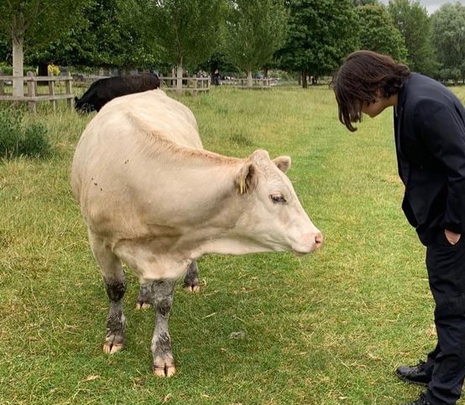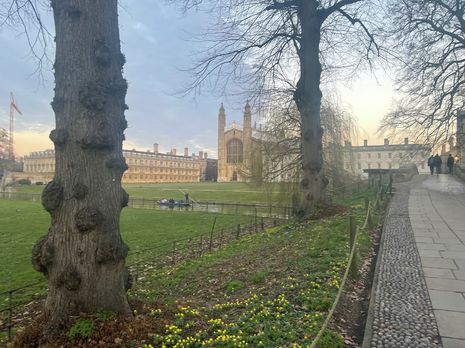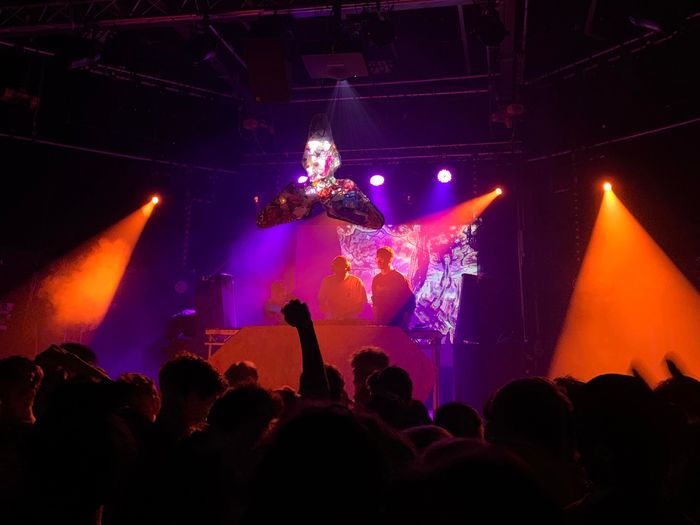Cow wars: The legend of an inter-collegiate beef
Paddy Davies Jones ruminates on the legend of inter-collegiate beef and urban myths

Cambridge has a whole menagerie of associated animals. The heraldry of the University and its colleges is replete with cockerels and pelicans, owls and eagles, deers and unicorns, lions of questionable shades (I refer of course to the strange blue cat that Emmanuel College seems to have mocked up in MS Paint … ) But let’s not kid ourselves. Magdalene can cling to its Peacock; the true animal that represents Cambridge is the cow. The humble Bos Taurus plods across the city’s fens and greens with a heavy sort of gracefulness, eliciting delight from residents, students, and tourists and that frequent, joyful exclamation – “Cows!”
The most iconic of these cows are of course those that graze on the field of the King’s College backs. They occupy the foreground of endless bucolic snapshots, reproduced in postcards and Instagram stories. These cows seem to embody Cambridge at its most glorious, most aggressively picturesque. They’re iconic enough to have been the subject of an April Fools’ prank in another Cambridge-based student publication that shall not be named .
“Corpus, the only college founded by common townspeople, had its herd snatched away from it by the whims of a monarch”
Yet, like so much of Cambridge, they are also a subject of rumour. The internet attests to the (almost certainly apocryphal) suggestion that they graze their field in order to block the construction of new John’s accommodation, or the (distinctly more plausible) tale that they have occasionally been slaughtered and served up at College Hall. Yet I’m aware of one rumour regarding these cows that seems yet to be posted online, so I feel a personal duty to spread awareness on this urgent matter.
Ask any student of Corpus Christi College – of which I too am a member – and they’ll probably inform you, with a distinct sort of central-college confidence, that the cows are ours. King’s College, in its regal shamelessness, stole our cows!

How exactly this is meant to have happened is the subject of some dispute. One suggestion has it that the land on which the field sits was originally the property of Corpus, and that when King Henry IV appropriated a chunk of central Cambridge to be the site of his Eton Mark II, he took our bovine with him as well. As far as I could tell this is entirely untrue. It’s also less fun than the other version of the tale – that we lost the cows to King’s College in a bet.
“In a place already bound up in arcane quirkiness, it is tempting to lend undue credence to urban myths”
A desire still burns in the Corpus student body to get our cows back. I’ve hatched a few drunken – mostly joking, but what if ... ? – plans to steal them back with fellow Corpuscles. Could one, for instance, spirit them off up the Cam in a get-away punt? Or dress them up as tourists and have the always thorough King’s porters turf them out onto the A1134? Wrap them in communist flags, since King’s seems to like ridding itself of those? Potentially flawed plans of action. But nonetheless, the perception remains that Corpus, the only college founded by common townspeople, had its herd snatched away from it by the whims of a monarch.
Expect of course that, like most Cambridge mythology, this is all total bunk. No, nobody ever deconstructed the Mathematical Bridge and laid it out on a lawn in the 1960s. I’m still yet to confirm the veracity of the claim that someone once submitted their English coursework carved into a frozen fish. The University has been around for 800 or so years – in a place already bound up in arcane quirkiness, it is tempting to lend undue credence to urban myths.
But in truth, the premise of the whole dispute is unfounded. It turns out that the oh-so-cinematic cows that munch on the riverside grass don’t belong to Corpus or King’s or any college for that matter. And as far as I’m aware no one has ever subjected them to a bet or nicked them. In actuality, they belong to the local farmer who rents the field and who, I imagine, is tired of the speculation. Vive les vaches — may they graze in peace.
 News / Cambridge students set up encampment calling for Israel divestment6 May 2024
News / Cambridge students set up encampment calling for Israel divestment6 May 2024 News / Cambridge postgrad re-elected as City councillor4 May 2024
News / Cambridge postgrad re-elected as City councillor4 May 2024 News / Some supervisors’ effective pay rate £3 below living wage, new report finds5 May 2024
News / Some supervisors’ effective pay rate £3 below living wage, new report finds5 May 2024 Fashion / Class and closeted identities: how do fits fit into our cultures?6 May 2024
Fashion / Class and closeted identities: how do fits fit into our cultures?6 May 2024 Features / Cambridge punters: historians, entertainers or artistes? 7 May 2024
Features / Cambridge punters: historians, entertainers or artistes? 7 May 2024






